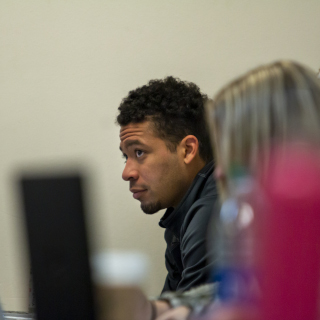It Starts With You
Career Development Planning
Career Development starts the day you set foot on campus. You don't have to know exactly where you are going to work, but you should start early by investigating your options and exploring career choices. By doing just these two things you will make a strong candidate from day one. Here are few things to think about as you move forward with your career:
Resumes
Start early and connect with Traci Beighle. Traci is working towards becoming a nationally certified resume writer and works with students in the College of Business to perfect their resumes. Make an appointment today, traci.beighle@mso.umt.edu
Networking & Branding
Often, when it comes to getting a job, it's not what you know but who you know. Everyone you meet is a potential network contact. And there is an art to networking. It starts with how you introduce yourself (your personal branding) and it ends with a memorable impression.
Dressing for Success
Employers have to make judgement calls, and they evaluate everything, including your clothes. Know how to make the best impression with the right outfit and accessories.
Informational Versus Formal Interviews
Informational Interview: An informational interview is meeting with individual to gain a better understanding of an occupation or industry and to build a network of contacts in that field. These take place in informal settings such as classrooms, coffee shops or other various locations.
Formal Interviews: A formal interview is a meeting with one or more people who ask you questions and evaluate you for a job or internship. These take place in an office settings or via Skype.
Tips Before the Interview
Be sure you do your research before you do any type of interview. Find out about the person you will be interviewing with, the company s/he works for, and the industry. Be prepared with a handful of pertinent questions you can ask and be sure to bring a notebook to take notes on the answers you receive.
Rule No. 1 with an informational interview: Don’t ask for a job! This is not the time or place to ask for a job or an internship; the person you are meeting with has agreed only to discuss the career field with you, not give you a job.
Rule No. 1 with a formal interview: Dress up. Always err on the side of being too dressed up. Professional clothing is encouraged at job interviews.
To practice your interviewing skills go to the UM Career Services website and make an appointment. Here you can sit down one on one with a career counselor, practice your skills and receive constructive criticism on how to improve. Career Services has the ability to record your interview so you can review it and make adjustments.
Leadership Programs
Apply for these beginning your sophomore year, and keep an eye out for deadlines. These are one-week, all-expenses-paid summer programs, and they often result in internship offers for the following year.
Internships
Many companies will begin hiring in September for internships that take place the following summer. Be prepared to jump on Handshake to apply for these opportunities as soon as the fall semester starts. Also, watch out for COB Central emails containing information about internships, and start figuring out how you will keep track of all your application deadlines.
Jobs
September is often the busiest month for COB students as they apply for jobs, attend networking events, and start getting interviews. It happens much earlier than you might expect, and the first round of offers are usually accepted by December. Another round of hiring happens early in the Spring semester, but some companies only visit in the Fall. So start early and make sure to know what companies are doing recruiting visits at COB.
You will need more than a degree to compete with all the other graduates applying for the same jobs. If you volunteer, work a part-time job while you are in school, or do an internship, you will increase your skills and your marketability. As you progress through your years at COB, you will want to add as much career-relevant experience as you can to your resume.
Social Media
Social media can make or break your chances of getting hired. Many employers research you before an interview, and having your social media life and work life collide could be trouble. So as you set out on a job search here are a few things to think about:
- Change all of your profile settings on your social media pages to private.
- Hide those unprofessional profile photos.
- Give your friends a heads up and do not allow them to leave unprofessional comments. As your Mom always said-you're guilty by association.
- Do not tweet, post or comment on other people's work behaviors, or bash current/previous employers.
LinkedIn: Start a profile and get connected. This is where you would like future employers to see you first! If you do not know where to start see Traci Beighle in the Student Success Center, GBB L35.
